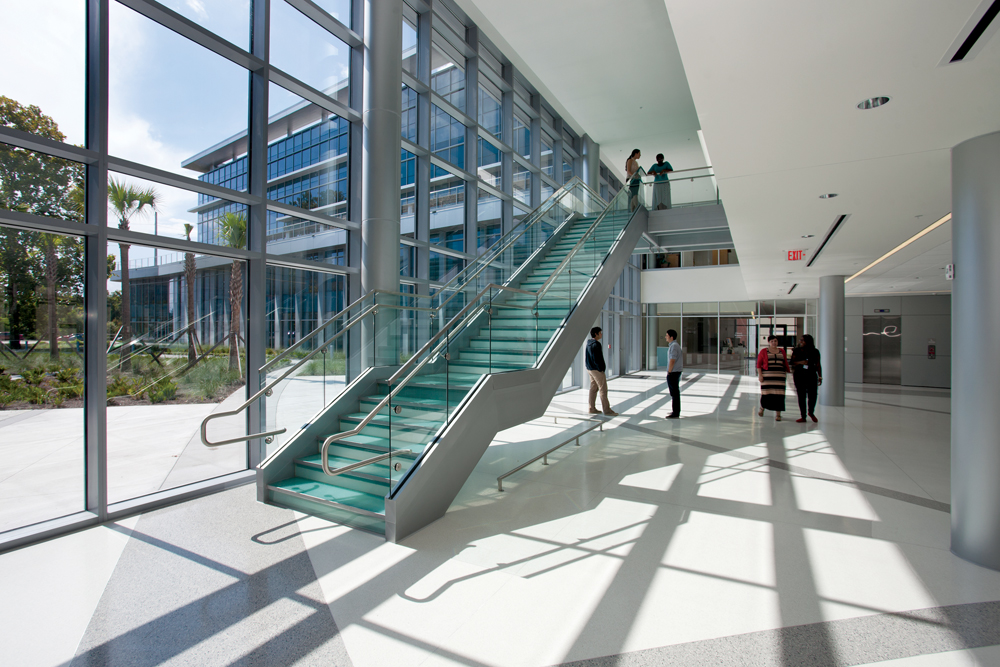Some science-design experts once believed high levels of sustainability would be possible only for low-intensity labs in temperate zones. However, LEED Silver- and Gold-rated science projects, including chemistry-heavy facilities in extreme climates, are no longer viewed as particularly remarkable.
Advancements in HVAC get much of the credit since controlled pressurization and once-through airflow are the main reason labs have historically used so much energy. Today’s Building Teams are striving to understand actual environmental requirements for safety and good science, instead of using dubious rules of thumb that drive overdesign. For instance, continuous air-quality assessment is now possible through sensor-based demand-controlled ventilation, decreasing reliance on arbitrary guidelines for air changes per hour. Other enabling technologies include advanced ductless fume hoods and submetering to assess plug loads.
Chilled beams, geothermal, photovoltaics, radiant heating and cooling, process water recycling, and passive design are among the essential ingredients for the next generation of super-green S+T projects. To date, fewer than 40 labs have earned LEED-NC Platinum—reflecting the typology’s difficulty level, as well clients’ cautiousness. The short list of completed net-zero S+T buildings includes the J. Craig Venter Institute, opening this month in La Jolla, Calif.; Georgia Tech’s Carbon-Neutral Energy Solutions Laboratory, the Platinum winner in BD+C’s 2013 Building Team Awards; and the National Renewable Energy Laboratory’s Research Support Facility, primarily devoted to computational work. Three small educational science buildings have also been certified under the Living Building Challenge.
The sector’s dedication to sustainability has been tested by the withdrawal of all federal funding for Labs21—an EPA- and DoE-sponsored program that long led the charge toward greener labs. Funding cuts have also constrained the participation of leading researchers, particularly at NREL and Lawrence Berkeley National Laboratory. The International Institute for Sustainable Laboratories—a nonprofit that had already been running the group’s annual conferences and continuing ed programs—has instituted a new membership-based structure and a mechanism for regional and local chapter formation, similar to that of ASHRAE.
“I2SL perpetuates and expands on the mission of Labs21,” says Phil Wirdzek, President and Executive Director. “We are actively working to develop training and share expertise on creating sustainable labs and related high-tech facilities.” I2SL (www.i2sl.org) is now coordinating working groups to address the obstacles to achieving net-zero and other aggressive levels of green for new and existing facilities.
Perkins+Will recently completed the 120,000-sf Clinical and Translational Research Building for the University of Florida, serving not only the Gainesville campus but also the state at large. Tenants include the UF Clinical and Translational Science Institute and Institute of Aging, as well as groups studying biostatics, epidemiology, muscular dystrophy, and health outcomes and policy. Targeting LEED Platinum, the building includes PVs that will generate 8-12% of its power needs, advanced daylighting, rainwater recycling, and displacement ventilation systems. Also on the Building Team: AEI (MEP), Structural Engineers Group (SE), and Skanska USA (GC). PHOTO: © ROBIN HILL
Related Stories
Cultural Facilities | Mar 26, 2024
Renovation restores century-old Brooklyn Paramount Theater to its original use
The renovation of the iconic Brooklyn Paramount Theater restored the building to its original purpose as a movie theater and music performance venue. Long Island University had acquired the venue in the 1960s and repurposed it as the school’s basketball court.
Adaptive Reuse | Mar 26, 2024
Adaptive Reuse Scorecard released to help developers assess project viability
Lamar Johnson Collaborative announced the debut of the firm’s Adaptive Reuse Scorecard, a proprietary methodology to quickly analyze the viability of converting buildings to other uses.
Security and Life Safety | Mar 26, 2024
Safeguarding our schools: Strategies to protect students and keep campuses safe
HMC Architects' PreK-12 Principal in Charge, Sherry Sajadpour, shares insights from school security experts and advisors on PreK-12 design strategies.
Green | Mar 25, 2024
Zero-carbon multifamily development designed for transactive energy
Living EmPower House, which is set to be the first zero-carbon, replicable, and equitable multifamily development designed for transactive energy, recently was awarded a $9 million Next EPIC Grant Construction Loan from the State of California.
Museums | Mar 25, 2024
Chrysler Museum of Art’s newly expanded Perry Glass Studio will display the art of glassmaking
In Norfolk, Va., the Chrysler Museum of Art’s Perry Glass Studio, an educational facility for glassmaking, will open a new addition in May. That will be followed by a renovation of the existing building scheduled for completion in December.
Sustainability | Mar 21, 2024
World’s first TRUE-certified building project completed in California
GENESIS Marina, an expansive laboratory and office campus in Brisbane, Calif., is the world’s first Total Resource Use and Efficiency (TRUE)-certified construction endeavor. The certification recognizes projects that achieve outstanding levels of resource efficiency through waste reduction, reuse, and recycling practices.
Office Buildings | Mar 21, 2024
Corporate carbon reduction pledges will have big impact on office market
Corporate carbon reduction commitments will have a significant impact on office leasing over the next few years. Businesses that have pledged to reduce their organization’s impact on climate change must ensure their next lease allows them to show material progress on their goals, according to a report by JLL.
Adaptive Reuse | Mar 21, 2024
Massachusetts launches program to spur office-to-residential conversions statewide
Massachusetts Gov. Maura Healey recently launched a program to help cities across the state identify underused office buildings that are best suited for residential conversions.
Legislation | Mar 21, 2024
Bill would mandate solar panels on public buildings in New York City
A recently introduced bill in the New York City Council would mandate solar panel installations on the roofs of all city-owned buildings. The legislation would require 100 MW of solar photovoltaic systems be installed on public buildings by the end of 2025.


















